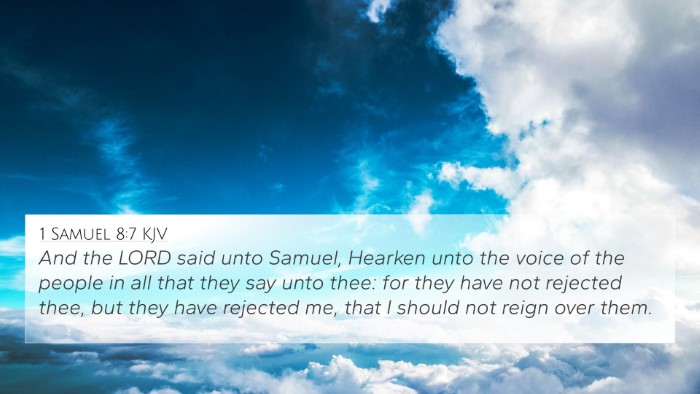Understanding 1 Samuel 8:22
Verse Context:
1 Samuel 8:22 states, "And the LORD said to Samuel, 'Heed their voice, and make them a king.' And Samuel said to the men of Israel, 'Every man go to his city.'"
Summary of the Verse Meaning
This verse marks a pivotal moment in Israel's history where the people request a king, demonstrating their desire for human leadership over divine guidance. God's response to Samuel signifies acceptance of their request, despite it being contrary to God's original intent for Israel to be governed by judges and prophets.
Commentary Insights
- Matthew Henry's Commentary: Henry notes that the Israelites' demand for a king was rooted in the desire to conform to the nations around them. They were dissatisfied with the theocratic rule and longed for a visible monarch. Henry emphasizes that this decision came from a lack of trust in God's provision, as He was to be their King.
- Albert Barnes' Notes: Barnes points out that God's consent to appoint a king reflects His willingness to grant the people's wishes, even when those wishes are not aligned with His perfect will. This highlights the distinction between God's permissive will and His prescriptive will, suggesting that sometimes, God allows people to follow their own paths, which may lead to unforeseen consequences.
- Adam Clarke's Commentary: Clarke elaborates on the significance of Samuel's role as a prophet and his reluctance to deliver the message of a coming king. He mentions that Samuel was displeased with the people's request but ultimately obedient to God’s directive. Clarke also indicates that this decision set a precedent for future governance and the complicated relationship between Israel and its kings.
Thematic Connections and Related Verses
1 Samuel 8:22 leads to various thematic connections and inter-Biblical dialogues. Here are some key Bible verses that relate to this scripture:
- Deuteronomy 17:14-15: This passage anticipates the future of Israel requesting a king, underscoring the conditions under which a king could be chosen.
- 1 Samuel 10:19: Here, the Israelites are reminded that they have rejected God as their king, showing a direct link to their earlier request.
- 1 Samuel 12:12: Samuel confronts Israel about their decision to seek a king, which reflects their discontent with divine leadership.
- Isaiah 30:1: This verse shows the dangers of seeking human guidance over divine direction, parallel to Israel's request for a king.
- Hosea 13:10-11: Hosea comments on Israel's leadership choices, emphasizing the consequences of appointing a king.
- 1 Corinthians 1:25: Paul contrasts God's wisdom with man's folly, which connects to Israel’s choice to seek a king for temporal security.
- John 18:36: Here, Jesus speaks about His kingdom not being of this world, presenting a stark contrast to the kingship the Israelites desired.
Insights into Human Leadership vs. Divine Guidance
The request for a king indicates humanity's tendency to seek visible leadership instead of relying on God's unseen guidance. This theme resonates throughout scripture, as God consistently emphasizes the importance of faith and obedience over societal norms.
Cross-Referencing the Kingdom Principle
In this exploration, we note several principles regarding God's kingdom that emerge from 1 Samuel 8:22:
- God's Sovereignty: Despite the people's desire for a king, God's ultimate authority is upheld, reminding us that He retains control over earthly affairs.
- Human Rebellion: The request for a king reflects a broader theme of rebellion against divine authority found throughout scripture.
- Spiritual Implication: The decisions made in this historical context have spiritual implications for readers, encouraging reflection on the leadership structures in their own lives.
Tools for Bible Cross-Referencing
To delve deeper into the connections within scripture, consider using tools such as a Bible concordance or a cross-reference Bible study guide. These resources help in identifying connections between Old and New Testament teachings, as well as exploring cross-referenced themes in the Bible.
Conclusion
1 Samuel 8:22 serves as a profound reminder of the complexities surrounding human and divine leadership. The desire for a king reveals much about the human condition and the ongoing dialogue between faith in God and the appeal of worldly authority.




